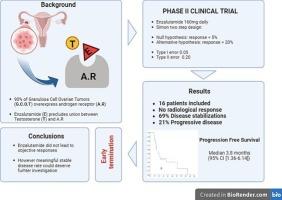评估恩杂鲁胺对晚期不可切除颗粒细胞卵巢肿瘤疗效的 II 期临床试验:GREKO III研究(GETHI2016-01)。
IF 4.5
2区 医学
Q1 OBSTETRICS & GYNECOLOGY
引用次数: 0
摘要
背景:颗粒细胞卵巢肿瘤(GCT)是一种孤儿病,治疗手段有限。由于大多数肿瘤中激素受体过度表达,激素治疗是一种潜在的治疗方法。本研究探讨了抗雄激素药物恩杂鲁胺在转移性病例中的活性:我们在西班牙横向肿瘤学及罕见和孤儿肿瘤协作组(GETTHI)的框架下设计了一项 II 期临床试验。符合条件的参与者为罹患晚期GCT的成年女性。主要终点是客观反应率。次要终点包括临床获益率、无进展生存期、总生存期和安全性。患者接受恩杂鲁胺 160 毫克,每日一次:2018年4月至2020年3月,9家机构共筛选出18名患者,纳入16名患者。中位年龄为56.4岁(45-71岁不等),大多数为白种人(14例),1例为阿拉伯人,1例为拉丁人。13 例患者(81%)的 ECOG 表现为零,3 例患者(19%)的 ECOG 表现为 1。6名患者(38%)曾接受激素治疗作为辅助治疗或晚期疾病治疗,15名患者(94%)曾接受化疗。从转移到进入研究的中位时间为 96 个月(4.5-198 个月)。未观察到客观反应,但临床获益率达到 68.8%(95% CI [46%-91.5%])。无进展生存期中位数为 3.8 个月(95 % CI [1.36-6.14])。中位总生存期未达到,中位随访时间为 6 个月(2.2-19 个月)。数据库关闭时,有 14 名患者停止了治疗,其中 13 人因疾病进展而停止治疗,1 人因个人选择而停止治疗。有 2 例因疾病进展而死亡的记录。共报告了5例3级不良反应,其中只有1例(气喘)被认为与治疗有关:尽管恩杂鲁胺在GCT中表现出适度的活性,但在某些病例中观察到了持久的稳定性:试验注册:ClinicalTrials.gov Identifier:试验注册:ClinicalTrials.gov Identifier:NCT03464201。本文章由计算机程序翻译,如有差异,请以英文原文为准。

Phase II clinical trial assessing the efficacy of enzalutamide in advanced non-resectable granulosa cell ovarian tumors: The GREKO III study (GETHI2016–01)
Background
Granulosa cell ovarian tumors (GCT) are orphan disease with limited treatments. Hormone therapy is a potential treatment, due to the overexpression of hormone receptors in most tumors. This study explores the activity of the antiandrogen, enzalutamide, in metastatic cases.
Methods
We designed a phase II clinical trial under the Spanish Collaborative Group for Transversal Oncology and Rare and Orphan Tumors (GETTHI). Eligible participants were adult women with advanced GCT. Primary endpoint was objective response rate. Secondary endpoints included clinical benefit rate, progression-free survival, overall survival, and safety profile. Patients received enzalutamide 160 mg once daily.
Results
From April 2018 to March 2020, eighteen patients were screened, and sixteen were included across nine institutions. Median age was 56.4 years (range 45–71), and most were Caucasian (14 cases), one Arabian and one Latin. ECOG performance status was zero in 13 cases (81 %) and one in three (19 %). Six patients (38 %) had previously received hormone therapy as adjuvant treatment or for advanced disease, and 15 (94 %) chemotherapy. Median time from metastasis to study entry was 96 months (range 4.5–198).
No objective response was observed, but the clinical benefit rate reached 68.8 % (95 % CI [46 %–91.5 %]). Median progression-free survival was 3.8 months (95 % CI [1.36–6.14]). Median overall survival was not reached, with a median follow-up of 6 months (range 2.2–19).
At the time of database closure, 14 patients had discontinued treatment, 13 due to disease progression and one by personal choice. Two deaths attributed to disease progression were recorded.
Five grade 3 adverse events were reported, with only one (asthenia) deemed related to the therapy.
Conclusions
Although enzalutamide demonstrated modest activity in GCT, durable stabilization was observed in some cases.
Trial Registration: ClinicalTrials.gov Identifier: NCT03464201
求助全文
通过发布文献求助,成功后即可免费获取论文全文。
去求助
来源期刊

Gynecologic oncology
医学-妇产科学
CiteScore
8.60
自引率
6.40%
发文量
1062
审稿时长
37 days
期刊介绍:
Gynecologic Oncology, an international journal, is devoted to the publication of clinical and investigative articles that concern tumors of the female reproductive tract. Investigations relating to the etiology, diagnosis, and treatment of female cancers, as well as research from any of the disciplines related to this field of interest, are published.
Research Areas Include:
• Cell and molecular biology
• Chemotherapy
• Cytology
• Endocrinology
• Epidemiology
• Genetics
• Gynecologic surgery
• Immunology
• Pathology
• Radiotherapy
 求助内容:
求助内容: 应助结果提醒方式:
应助结果提醒方式:


